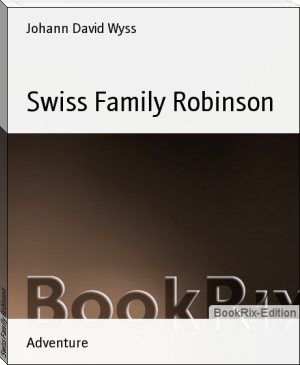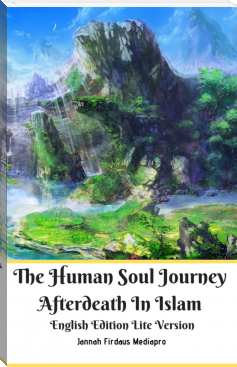Swiss Family Robinson - Johann David Wyss (poetry books to read txt) 📗

- Author: Johann David Wyss
- Performer: -
Book online «Swiss Family Robinson - Johann David Wyss (poetry books to read txt) 📗». Author Johann David Wyss
edition of the book exists in <any> language.
Johann David Wyss, a Swiss pastor, originally wrote this book
to entertain and instruct his four sons. Years later, his son
Johann (or Jean—accounts differ) Rudolf Wyss, by then a professor
of philosophy, persuaded his father to allow him to complete and
edit the unfinished manuscript. It was published in two volumes
in Zurich in 1812-1813.
Its French translator, Mme de Montholieu, obtained permission
to greatly enlarge the book. It was published in five volumes
from 1824 through 1826. The first English edition, abridged,
was published in 1814; it was followed by several other English
translations of varying quality. In 1849 W. H. G. Kingston
re-translated, and greatly abridged, Mme. De Montholieu’s
version. Most English versions are based on Kingston’s abridged
version.
Despite a vast number of amusing errors in flora and fauna, the
book has entertained, and warmed the hearts of, many generations.
However, most modern editions omit an incredible amount even of
Kingston’s translation by making small cuttings here and there,
some of them maddeningly inept. The Editor’s Cut edition from
Pink Tree Press has been based on, and compared with, no fewer
than five previous editions, all of them out of copyright. Most,
though not all, of the cuttings have been restored. The material
that continues to be omitted is of little imaginable interest to
anyone other than a scholar of nineteenth century literature.
Paragraphing has been redone in order to facilitate ease of
reading. Some archaic spelling and grammar have been retained,
as they are part of the flavor of the book; they have been changed
where necessary for clarity. The British-style punctuation has
been retained. The lengthy and unnecessary chapter headings have
been omitted. Some parenthetical information is provided, most
often to define words no longer to be found in many English
dictionaries.
Anne Wingate, Ph.D.
Editor-in-Chief
Pink Tree Press
For many days we had been tempest-tossed. Six times had the darkness
closed over a wild and terrific scene, and returning light as often
brought but renewed distress, for the raging storm increased in
fury until on the seventh day all hope was lost.
We were driven completely out of our course; no conjecture
could be formed as to our whereabouts. The crew had lost heart,
and were utterly exhausted by incessant labour. The riven masts
had gone by the board, leaks had been sprung in every direction,
and the water, which rushed in, gained upon us rapidly.
Instead of reckless oaths, the seamen now uttered frantic cries to
God for mercy, mingled with strange and often ludicrous vows, to
be performed should deliverance be granted. Every man on board
alternately commended his soul to his Creator, and strove to
bethink himself of some means of saving his life.
My heart sank as I looked round upon my family in the midst of
these horrors. Our four young sons were overpowered by terror.
`Dear children,’ said I, `if the Lord will, He can save us even
from this fearful peril; if not, let us calmly yield our lives
into His hand, and think of the joy and blessedness of finding
ourselves for ever and ever united in that happy home above.
Even death is not too bitter, when it does not separate those
who love one another.’
At these words my weeping wife looked bravely up, and, as the
boys clustered round her, she began to cheer and encourage them
with calm and loving words. I rejoiced to see her fortitude,
though my heart was ready to break as I gazed on my dear ones.
We knelt down together, one after another praying with deep
earnestness and emotion. Fritz, in particular, besought help
and deliverance for his dear parents and brothers, as though
quite forgetting himself. Our hearts were soothed by the never-failing comfort of child-like confiding prayer, and the horrors
of our situation seemed less overwhelming. `Ah,’ thought I,
`the Lord will hear our prayer! He will help us.’
Amid the roar of the thundering waves I suddenly heard the cry
of `Land! land!’, while at the same instant the ship struck with
a frightful shock, which threw everyone to the deck, and seemed
to threaten her immediate destruction. Dreadful sounds betokened
the breaking up of the ship, and the roaring waters poured in on
all sides.
Then the voice of the captain was heard above the tumult, shouting,
`Lower away the boats! We are lost!’
`Lost!’ I exclaimed, and the word went like a dagger to my heart;
but seeing my children’s terror renewed, I composed myself,
calling out cheerfully, `Take courage, my boys! We are all above
water yet. There is the land not far off, let us do our best to
reach it. You know God helps those that help themselves! Remain
with your mother, while I go on deck to see what is best to be
done now.’ With that, I left them and went on deck.
A wave instantly threw me down; another followed, and then another,
as I contrived to find my footing. The ship was shattered on all
directions, and on one side there was a large hole in the hull.
Forgetting the passengers, the ship’s company crowded into the
lifeboats, and the last who entered cut the davit ropes to cast
each boat into the sea.
What was my horror when through the foam and spray I beheld the
last remaining boat leave the ship, the last of the seamen spring
into her and push off, regardless of my cries and entreaties that
we might be allowed to share their slender chance of preserving
their lives. My voice was drowned in the howling of the blast,
and even had the crew wished it, the return of the boat was
impossible, for the waves were mountain-high.
Casting my eyes despairingly around, I became gradually aware
that our position was by no means hopeless, inasmuch as the
stern of the ship containing our cabin was jammed between two
high rocks, and was partly raised from among the breakers which
dashed the forepart to pieces. As the clouds of mist and rain
drove past, I could make out, through rents in the vaporous
curtain, a line of rocky coast, and, rugged as it was, my heart
bounded towards it as a sign of help in the hour of need.
Yet the sense of our lonely and forsaken condition weighed heavily
upon me as I returned to my family, constraining myself to say
with a smile, `Courage, dear ones! Although our good ship will
never sail more, she is so placed that our cabin will remain
above water, and tomorrow, if the wind and waves abate, I see no
reason why we should not be able to get ashore.’
These few words had an immediate effect on the spirits of my
children, for my family had the habit of trusting in my assurances.
The boys at once regarded our problematical chance of escaping as
a happy certainty, and began to enjoy the relief from the violent
pitching and rolling of the vessel.
My wife, however, perceived my distress and anxiety in spite of
my forced composure, and I made her comprehend our real situation,
greatly fearing the effect of the intelligence on her nerves. Not
for a moment did her courage and trust in Providence forsake her,
and on seeing this, my fortitude revived.
`We must find some food, and take a good supper,’ said she, `it
will never do to grow faint by fasting too long. We shall require
our utmost strength tomorrow.’
Night drew on apace, the storm was as fierce as ever, and at
intervals we were startled by crashes announcing further damage
to our unfortunate ship. We thought of the lifeboats, and feared
that all they contained must have sunk under the foaming waves.
`God will help us soon now, won’t He, father?’ said my youngest
child.
`You silly little thing,’ said Fritz, my eldest son, sharply,
`don’t you know that we must not settle what God is to do for
us? We must have patience and wait His time.’
`Very well said, had it been said kindly, Fritz, my boy. You too
often speak harshly to your brothers, although you may not mean
to do so.’
A good meal being now ready, my youngsters ate heartily, and
retiring to rest were speedily fast asleep. Fritz, who was of
an age to be aware of the real danger we were in, kept watch
with us. After a long silence, `Father,’ said he, `don’t you
think we might contrive swimming-belts for mother and the boys?
With those we might all escape to land, for you and I can swim.’
`Your idea is so good,’ answered I, `that I shall arrange something
at once, in case of an accident during the night.’
We immediately searched about for what would answer the purpose,
and fortunately got hold of a number of empty flasks and tin
canisters, which we connected two and two together so as to form
floats sufficiently buoyant to support a person in the water, and
my wife and young sons each willingly put one on. I then provided
myself with matches, dry tinder, knives, cord, and other portable
articles, trusting that, should the vessel go to pieces before
daylight, we might gain the shore, not wholly destitute.
Fritz, as well as his brothers, now slept soundly. Throughout the
night my wife and I maintained our prayerful watch, dreading at
every fresh sound some fatal change in the position of the wreck.
At length the faint dawn of day appeared, the long weary night was
over, and with thankful hearts we perceived that the gale had begun
to moderate; blue sky was seen above us, and the lovely hues of
sunrise adorned the eastern horizon.
I aroused the boys, and we assembled on the remaining portion of
the deck, when they, to their surprise, discovered that no one
else was on board.
`Hallo, papa! What has become of everybody? Are the sailors gone?
Have they taken away the boats? Oh, papa! why did they leave us
behind? What can we do by ourselves!’
`My good children,’ I replied, `we must not despair, although we
seem deserted. See how those on whose skill and good faith we
depended have left us cruelly to our fate in the hour of danger.
God will never do so. He has not forsaken us, and we will trust
Him still. Only let us bestir ourselves, and each cheerily do his
best. Who has anything to propose?’
`The sea will soon be calm enough for swimming,’ said Fritz.
`And that would be all very fine for you,’ exclaimed Ernest, `for
you can swim, but think of mother and the rest of us! Why not
build a raft and all get on shore together?’
`We should find it difficult, I think, to make a raft that would
carry us safe to shore. However, we must contrive something, and
first let each try to procure what will be of most use to us.’
Away we all went to see what was to be found, I myself proceeding
to examine, as of greatest consequence, the supplies of provisions
and fresh water within our reach.
My wife took her youngest son, Franz, to help her to attend to the
unfortunate animals on board, who were in a pitiful plight,
having been neglected for several days.
Fritz hastened to the arms chest, Ernest to look for tools;
and Jack went towards the captain’s cabin, the door of which
he no sooner opened, than out sprang two splendid large dogs,
who testified their extreme delight and gratitude by such
tremendous bounds that they knocked





Comments (0)